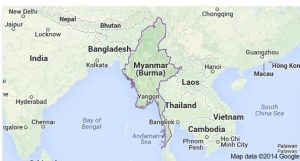Reflections on the Rohingya case

Since August 2017 thousands of Rohingya members have fled from Myanmar due to deliberately acts of persecution, which roots to an old ethnic conflict where majority of people resisted to recognized that community as a citizen of Myanmar (1). Accordingly, to General Secretary of the United Nations Mr. Antonio Guterres all this situation could be perfectly framing under the legal category of “ethnic cleansing”. In this post, I would like to pointed out two topics: (i) to relate the cause of this conflict due to material conditions, and (ii) the necessity that neighbours countries recognize the Rohingya refugees under “prima facie” collective process.
The economical roots for this persecution
There is a common explanation to the Rohingya persecution case on arguments where it says that the main causes are just ethnic and historical differences. Yet, there is another way to find the main causes for this conflict in the economical realm. A research made by “The conversation” base on evidence that shows that religion or ethnic difference are no the only causes for this persecution, and it is important to notice how economical factor has influence this humanitarian crisis (2). Whereas, there has been a myriad of tensions between different ethnic groups and economical interest around land and extractive natural resources.
This research explains how historically in Myanmar the confiscation of Land has been a widespread practice by the State and Military agents. This practice works as an effective way to cause desposetion and for fulfil economical purposes in terms to secure extractions industries interests mainly. So that, it is sensitive to take into account this kind of factor in order to assesses in adequate way the real dimension of the problem.
This connection between extractive industries, land dispossession and causing social conflicts affecting minorities groups it seems as a trends worldwide, with a harder impact among Global South communities.
The necessity of a prima facie procedural asylum recognition
Another important point to is to advocate for an effective protection responses to the Rohingya humanitarian needs. International Refugee Law established that the Recognition of Refugee status could be made either individually or in collective way. In this line, it is important for International community to press to neighbour countries in order they offer fair and fast Refugee Status Determination under the institution of “prima facie” process. UNHCR has defined the prima facie process as “[s]situations have […] arisen in which entire groups have been displaced under circumstances indicating that members of the group could be considered individually as refugees. In such situations the need to give assistance is often extremely urgent and it may not be possible for purely practical reasons to carry out an individual determination of refugee status for each member of the group. Recourse has therefore been had to so-called “group determination” of refugee status, whereby each member of the group is regarded prima facie (i.e. in the absence of evidence to the contrary) as a refugee.” (3)
In other words, due to the objective evidence from Country of Origin and massive persecution that are facing Rohingya as ethnic group it is a necessity that their Refugees Status Determination will be determinate in a collective way. Therefore, their basic need could be addressed in a more proper way.
References:
- https://www.theguardian.com/world/2017/sep/11/un-myanmars-treatment-of-rohingya-textbook-example-of-ethnic-cleansing
- http://theconversation.com/religion-is-not-the-only-reason-rohingyas-are-being-forced-out-of-myanmar-83726
- UNHCR, Handbook and Guidelines on Procedures and Criteria for Determining Refugee Status under the 1951 Convention and the 1967 Protocol Relating to the Status of Refugees, reissued December 2011, HCR/1P/4/ENG/REV.3 (hereafter “UNHCR, Handbook”), para. 44.
